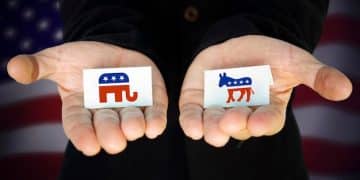Understanding the Implications of Campaign Finance Reform

The implications of proposed changes to campaign finance regulations encompass a wide range of potential impacts on political participation, election outcomes, and the balance of power between different groups in society.
The landscape of campaign finance regulations is constantly evolving, and understanding the implications of proposed changes is crucial for anyone involved in or affected by the US political system. What are the implications of the proposed changes to campaign finance regulations, and how will they impact future elections?
Campaign Finance Regulations: An Overview
Campaign finance regulations are a cornerstone of American democracy, designed to ensure fairness and transparency in political campaigns. These rules govern how money is raised and spent in elections, with the goal of preventing undue influence and promoting a level playing field for all candidates.
Understanding the basics of campaign finance laws is essential to grasping the potential impact of proposed changes. This includes regulations on individual and corporate contributions, as well as spending limits and disclosure requirements.
Key aspects of current campaign finance regulations:
- Contribution Limits: Legal limits on the amount of money individuals and organizations can donate to campaigns.
- Disclosure Requirements: Rules mandating the reporting of campaign contributions and expenditures.
- Independent Expenditures: Spending by groups independent of campaigns or parties.
Examining the existing framework allows us to evaluate how proposed changes could reshape the political landscape and affect the integrity of elections.
The Rationale Behind Proposed Changes
Proposed changes to campaign finance regulations often stem from a variety of concerns about the current system. Advocates for reform argue that the existing rules are inadequate to address issues such as the rise of super-PACs and dark money, which allow for unlimited spending in elections without full disclosure.
The underlying goal of these proposed changes is typically to enhance fairness, transparency, and accountability in campaign finance. By addressing loopholes and modernizing regulations, reformers hope to mitigate the potential for corruption and ensure that elections are decided by the will of the people, rather than the size of campaign war chests.
Common arguments for campaign finance reform:
- Leveling the Playing Field: Ensuring that candidates with less financial backing have a fair chance to compete.
- Reducing Corruption: Preventing wealthy donors and special interests from exerting undue influence on policymakers.
- Promoting Transparency: Requiring full disclosure of campaign contributions and expenditures to inform voters.

These reforms aim to create a more equitable and transparent electoral process, one more resistant to undue influence.
Potential Impacts on Political Parties
Changes to campaign finance regulations can significantly impact the strategies and resources available to political parties. Depending on the specifics of the reforms, parties may need to adapt their fundraising tactics, messaging strategies, and overall campaign operations.
For example, stricter limits on individual contributions could force parties to rely more on small-dollar donors and grassroots fundraising efforts. Conversely, loosening regulations on corporate or union spending could give certain parties a financial advantage, potentially skewing the playing field in their favor.
How campaign finance regulations affect parties:
- Fundraising Strategies: Parties may need to shift their focus to different sources of funding, such as small donors or online fundraising platforms.
- Messaging and Outreach: Changes in spending limits or disclosure requirements could affect how parties communicate with voters.
- Campaign Operations: Parties may need to restructure their campaign operations to comply with new regulations.
It is vital to consider how proposed changes influence the balance of power between major and minor parties.
Effects on Interest Groups and Advocacy Organizations
Interest groups and advocacy organizations play a crucial role in American politics, often spending large sums of money to influence elections and policy debates. Changes to campaign finance regulations can significantly affect the ability of these groups to participate in the political process.
For example, regulations targeting independent expenditures or dark money could limit the ability of these organizations to run ads or engage in other campaign activities. At the same time, reforms aimed at promoting transparency could expose hidden sources of funding and hold these groups more accountable for their actions.

Different levels of transparency for campaign contributions shape the influence these organizations wield.
Considerations for interest groups and advocacy organizations:
Assessments of the following factors help reveal possible shifts in influence.
- Spending limits on independent expenditures
- Transparency in campaign activities and funding sources
- Organizational campaigning ability under new regulations
Understanding these considerations is critical in understanding the potential influence of campaign regulations.
Implications for Voter Participation and Engagement
The ultimate goal of campaign finance regulations is to promote fair and democratic elections. However, the impact of these regulations on voter participation and engagement is a complex and often debated topic.
Some argue that stricter regulations can reduce the influence of money in politics and create a more level playing field, encouraging more candidates to run and more voters to participate. Others contend that these regulations can stifle free speech and limit the ability of individuals and organizations to express their views, potentially discouraging political participation.
The type of candidate and community they represent can alter the importance of having substantial funding.
Effects on Voter demographics:
Voter participation numbers are affected depending on which groups feel most impacted.
- Influence of Regulations on Public Opinion
- Financial freedom of candidates from certain demographics
- Effectiveness limits on organizations for mobilizing voters
Balancing free speech rights with the need for fairness in elections is a recurring challenge in campaign finance reform.
Challenges and Criticisms of Campaign Finance Reform
Despite the good intentions behind campaign finance reform, these efforts often face numerous challenges and criticisms. One common concern is that regulations designed to limit spending can inadvertently stifle free speech and restrict the ability of candidates and organizations to express their views.
Another challenge is the difficulty of crafting regulations that effectively address the influence of money in politics without creating unintended consequences. Loopholes in the law can allow wealthy donors and special interests to find ways to circumvent the rules, while complex regulations can be difficult to enforce and may disproportionately burden smaller campaigns and organizations.
Potential drawbacks of campaign finance reform include difficulties around free speech and unintended loopholes.
| Key Point | Brief Description |
|---|---|
| ⚖️ Fairness | Aim to level the playing field for political candidates. |
| 💰 Funding | Affect fundraising strategies and resources for parties. |
| 📢 Transparency | Seek to make sources of campaign funding more visible. |
| 🗳️ Voter Turnout | Can either encourage or discourage voter participation. |
Frequently Asked Questions
▼
Campaign finance regulations are laws that govern how money is raised and spent in political campaigns, including limits on contributions, disclosure requirements, and rules for independent expenditures.
▼
Changes are often proposed to address concerns like the influence of large donors, the rise of dark money, and the need for greater transparency to ensure a more fair electoral process.
▼
These changes can influence fundraising strategies by making parties rely more or less on individual or organizational donations, and messaging strategies depending on the spending limits placed.
▼
“Dark money” refers to funds spent to influence political outcomes where the donors are not disclosed. Proposed reforms aim to increase transparency, expose these donors, and hold groups publicly accountable.
▼
Yes, they can. Some argue stricter rules enhance fairness, encouraging more candidates and voters. Others say regulations stifle free speech, potentially discouraging political participation but limiting misinformation.
Conclusion
In conclusion, understanding the implications of proposed changes to campaign finance regulations is essential for anyone involved in or affected by the US political system, and can provide valuable insight into the future of elections.





